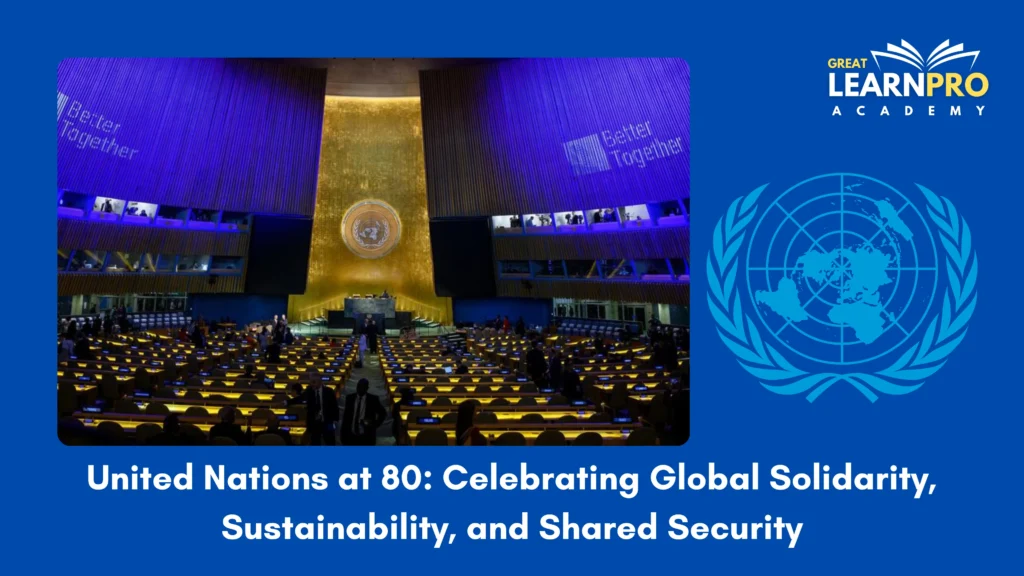As the world commemorates the 80th United Nations (UN) Day on October 24, 2025, the moment invites reflection on the organization’s enduring legacy and evolving role in a rapidly transforming global order. Founded in 1945 after the devastation of World War II, the UN was envisioned as a symbol of collective hope a platform to promote peace, human rights, and development. Eight decades later, it stands at a crossroads, balancing achievements and challenges that will define its role in the 21st century.

UN Day celebrates the entry into force of the UN Charter, which laid the foundation for a new era of multilateralism. Over the years, the organization has grown from its original 51 member states to 193, representing nearly every nation on Earth. It has become the cornerstone of global diplomacy, addressing crises that range from conflict resolution to humanitarian emergencies and climate change. The 80th anniversary, therefore, is not merely ceremonial it is an opportunity to assess how well the UN has lived up to its founding promise of saving succeeding generations from the scourge of war.
The theme for the 80th UN Day emphasizes “Solidarity, Sustainability, and Shared Security,” reflecting a world facing unprecedented challenges. The COVID-19 pandemic exposed deep inequalities, climate disasters threaten millions, and geopolitical tensions from Eastern Europe to the Middle East—continue to test global unity. The UN, under the leadership of Secretary-General António Guterres, has called for renewed commitment to multilateralism, stressing that no nation can tackle these global crises alone. The Sustainable Development Goals (SDGs), set to be achieved by 2030, remain the UN’s most ambitious agenda, yet progress has been uneven. The 80th year thus serves as both a milestone and a wake-up call to accelerate collective action.
One of the key focuses this year has been digital governance and artificial intelligence. The UN’s “Global Digital Compact” initiative aims to ensure that technology serves humanity rather than divides it. In the same spirit, discussions around reforming the Security Council have gained momentum, as many nations argue that the current power structure, established in 1945, no longer reflects today’s geopolitical realities. Calls for greater representation from the Global South, including countries like India, Brazil, and South Africa, echo the demand for a more inclusive UN that mirrors the multipolar world.
Equally significant is the UN’s continued advocacy for climate justice. From the Paris Agreement to COP30 in Brazil, the organization remains central to global environmental governance. As extreme weather events intensify, the UN is amplifying its call for climate finance, urging developed nations to honor their commitments to support developing countries in adaptation and mitigation efforts. The 80th anniversary thus becomes an occasion to reaffirm that protecting the planet is inseparable from protecting humanity.
The UN’s story is also one of quiet success peacekeeping missions that have stabilized regions, global health programs that have saved millions of lives, and human rights conventions that have reshaped international law. Yet, criticisms persist regarding bureaucracy, inefficiency, and political bias. As the world becomes more complex and fragmented, the UN must reinvent itself not by abandoning its ideals, but by modernizing its methods.
Eighty years on, the UN remains humanity’s best hope for collective progress. Its imperfections reflect the world it represents a world struggling yet striving toward peace and justice. As nations gather to celebrate this historic milestone, the message is clear: multilateralism is not obsolete, but indispensable. The future of the United Nations depends on whether the world can rediscover the same spirit of unity that inspired its founders in 1945.
Sources:
- https://www.reuters.com/world/middle-east/un-chief-warns-80-year-old-founding-charter-not-an-la-carte-menu-2025-06-26/?utm_
- https://apnews.com/article/985385cba3547a2e4286091ff36a1207?utm_
More Current affairs: https://learnproacademy.in/updates/
